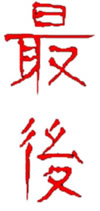






TRADITIONAL JAPANESE CULTURE
Lay the emphasis on the "traditional" in that, by the way. I have little use for Japan's present hyper-Western recycled plastic pop malaise. I've had about enough of Hello Kitty and Pokemon and chicks with eyes twice the size of the rest of their faces that I've almost been driven to walk completely away from a culture that I've loved for a very long time. These, and many other things besides, only remind me—quite painfully—of how far those once-proud people have fallen.
But that's as may be....It was a long time ago when I first discovered feudal Japan. During my fifth grade year, I think it was, one of the networks ran the television miniseries based on James Clavell's Shogun. Many people have castigated James Clavell extensively for his departures from true Japanese culture in that book—but hell, it made for a good story, and one that caught the interest of a bookish child and turned him into a fan of traditional Japan for life. I watched the miniseries raptly, and then immediately ransacked the local library seeking all the information available on this wonderful new culture that was so like medieval Europe, and yet so unlike it. This fascination continues to this day, having in the meantime become increasingly focused on the martial elements of premodern Japan—the samurai culture.
The Samurai
From the instant I first saw them, those proud, stern warriors spoke to something in my soul. That they were warlike to the extreme, that they rode into battle clad in armor, and wielded blades even as did the European knights who previously had compelled my interest—these gave the samurai an obvious attraction to a kid who read Tolkien as if it were the Holy Writ. Further, there was about the Japanese warrior culture a solemn emotional discipline that, when contrasted against the romantic excesses of European chivalry, seemed both utterly alien and also fascinating. That the samurai respected the gentle arts of painting, drawing, literature, and calligraphy—the very areas in which I most excelled—as much as the finesse of the blade drew me only the more strongly.
The Soul of the Samurai
My attraction to the samurai held more substance than just love of their grand appearance, warlike lifestyle, and impeccable taste, though, and it deepened further as I aged. The samurai's iron-clad rule of Bushido, his unswerving dedication to duty and principle regardless of personal cost, eventually came to embody one of my highest ideals. In My World, these qualities provide both accusation against and answer to the bankrupt hedonism, relativism, compromise, and denial of personal responsibility that so characterize Western society in the 20th Century.
Consider: What have we for role models in this 20th Century? We have our politicians, who hold in contempt the very law whereof they are our appointed stewards. We have our magnates of Wall Street, who have no other gods before their own base greed. We have our celebrities of sports and media, who interpret the public adulation as a carte blanche for license, excess, and depravity.
The world of the samurai was populated by vastly different figures. Consider the fourteenth century warrior Kusunoki Masashige, who fought a hopeless war for years in the service of a deposed emperor. His last words were, "Would that I had seven lives, that I might give them all for the Emperor," spoken before he took his own life that he might not fall into the hands of his enemies. Consider the immortal Forty-seven Ronin of the seventeenth century, who spared no effort to avenge their dead lord upon the man who brought him down, knowing all the while that under the Shogun's law, this vengeance would bring a sentence of death upon all of them. Consider Lord Shibata Katsuie, who, in the late sixteenth century, was cornered in his castle by the immensely stronger army of the Imperial Regent Toyotomi Hideyoshi. Realizing that the fortress must ultimately fall, Lord Shibata called all of his followers together in the great hall and informed them of this fact, whereat he declared a great feast. At the end of the feast, Lord Shibata ordered that the castle be set alight, and then calmly killed himself, after which all of his retainers did likewise—save one, who was chosen to carry word to Toyotomi Hideyoshi of the end of the Shibata house. This last samurai did as he was commanded, and then begged his leave of the Regent that he might retire to some quiet place and follow after his lord.
These, by God, were men of Substance.
In this context, I ponder the sad litany of our recent Presidents, among others. How these people have distorted, and evaded, and outright lied, and likewise invoked Privilege, to turn aside the penalties of their actions. Thus have they twisted, and made a travesty of the Law. Had a samurai been implicated in any one of the dozens of scandals that have tainted our government of late, he would have retired forthwith and cut his stomach.
"Hard, man...that's hard," people say to me when I talk of such things--and I suppose that what they say is true. But when they say this, I look back at them and reply, "Soft, man...that's soft."
Our world, I fear, is long overdue for a bit of metal.

Copyright © 2006, Troy Hunt. All rights reserved.